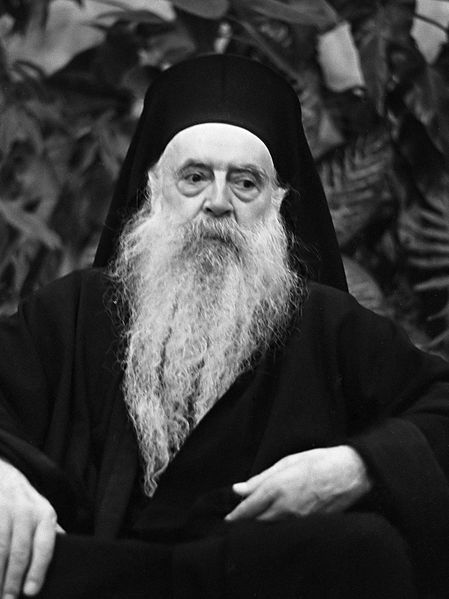Journey with the Orthodox: Biography of Ecumenical Patriarch Bartholomew reviewed by Harold D. Hunter
Ethnophyletism joins the Greek words for nation and tribalism and it refers to linking the Church to the destiny of any particular nation or racial group. The Pan-Orthodox Synod (Holy and Great Council) of 1872 strongly condemned ethnophyletism.

Patriarch Athenagoras I in 1967
Image: Pieter Jongerhuis / Anefo, Nationaal Archief / Wikimedia Commons
In my interview with Chryssavgis, the selection of the next Ecumenical Patriarch was clarified in terms of the composition of the Holy and Sacred Synod at the Ecumenical Patriarch that puts forward a list to be reviewed by the Turkish government before final decisions are made by the Synod. This review is not a routine matter as the Turkish government has – although rarely – removed names from the list in the past. This may explain the keen interest shown in making Athenagoras available for election so that he was flown from the USA to Turkey on USA President Harry Truman’s Air Force One and granted Turkish citizenship before disembarking at the Atatürk Airport. Since the 11th Century, the deciding Synod of 12 were all Greeks who met in Constantinople. Under the leadership of Ecumenical Patriarch Bartholomew, now eleven of twelve bishops of the Synod come from a variety of countries with no particular part of the world intentionally favored in the rotation.
#3 – Ecumenism
Archdeacon Chryssavgis is justified in making much of Bartholomew’s commitment to ecumenism and dialogues with other religions. On this point, certainly Bartholomew must be rewarded for having extended a hand of friendship to Pentecostals who are most often cast as proselytizers of the Orthodox faithful in the Christian East. As Chryssavgis points out, however, Bartholomew has paid a price for his commitment of ecumenism which should spur supporters of Bartholomew to speak up firmly but with sensitivities to how one may be heard by various Orthodox hierarchs.
Chryssavgis makes a poignant plea on Bartholomew’s behalf when it comes to conducting a ministry of reconciliation. Chryssavgis explained to me that he finds a parallel here with St. John Chrysostom who was open to the church of Antioch, but also Alexandria when under Cyril challenged Constantinople’s primacy. Chrysostom received delegates from Alexandria which would have generated controversy. For his part, Bartholomew has had to endure being labelled a heretic or traitor by those who cling to a rigid narrow interpretation of Tradition.
This kind of response is not unknown to Pentecostal pioneer ecumenists such as myself who continue to seek to bring a Pentecostal presence to any table that welcomes such a voice. Pentecostals will find it of interest that Chryssavgis claims that Bartholomew turned the World Council of Churches Faith & Order Commission toward the “Apostolic Faith” project. I remember publishing the first Pentecostal response to such an ecumenical document and arguing that Pentecostals were innately drawn to discussions about apostolicity.
Category: Ministry, Winter 2017


